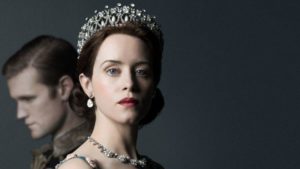By Abigail Dotterer || Contributing Writer

I’m a history buff. I am at the point that I can tell you random facts about different events off the top of my head. This also means that for my entertainment preferences, I absolutely love the historical fiction genre– whether it be movies, books or television shows. However, when watching or reading things from this category, I have to wonder– how does the consumption of the genre change the way people learn about history? Is historical fiction good or bad?
Right now, my latest obsession is the Netflix original, The Crown. However, this may or may not be because of my huge celebrity crush on Matt Smith who portrays one of my favorite historical figures, Prince Philip. To be honest, I’ve watched pretty much all there is on Netflix about the British monarchy. Looking at the Windsor dynasty this way, I can say that I’ve had a mixed experience when learning about them. This can also go for almost any historical topic you learn about through a Netflix show. With this being the main historical period drama that I watch at the moment, I can see how educational these series could possibly be. They can give the viewer a sense of what different time periods were like. For movies and television shows, this could be through costume and set design. You probably wouldn’t see pirates in a story about 1980s Europe. As for novels, the reader should be able to tell the period through the author’s setting descriptions. Through these platforms, modern day people can see how these characters and mostly actual people in that time used to live.
Another pro for diving into the historical fiction genre is that, in my opinion, it gives the viewer a sense of historical context and a way to gain more information than you might in a history class. For example, though we were learning about England’s role in World War II last year, I never knew that the country had an almost brand new king. How did I learn this? Through watching The Crown. Throughout the episodes, I learned that King Edward VIII was the first British monarch to abdicate the throne. By his decision, the crown was passed to his brother, who would become King George VI. If this didn’t happen, Elizabeth II would never have become Queen.
While the show is mainly about Queen Elizabeth, it shows the lives of other characters, such as her father, the King’s struggle with cancer, which you can’t really see in a textbook. However, if there wasn’t this, what would the plot be like? Would it still be intriguing?
There is a huge con that can completely shape whatever historical show or book you’re interacting with– bias. It can change how scripts and novels are written, whether to be in a super positive and praising light or one that is quite negative. Accuracy also affects how these forms of entertainment can be consumed, it all depends on how much research was put into a project. Along with accuracy, one shouldn’t believe everything a historical piece says– especially films and shows, they can all easily be fictionalized due because of the hunger and need for drama. However, you should look into the entertainment’s new information that you didn’t know before– like King Edward’s abdication mentioned earlier.
Historical fiction is neither good or bad. Yes, it gives you icing on the cake when looking at different events and but can also possibly be biased and fictionalized. Either way, this genre can give you an interesting scope about the past.
First-year Abigail Dotterer is a contributing writer. Her email is adottere@fandm.edu.